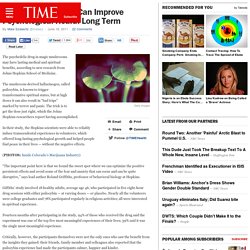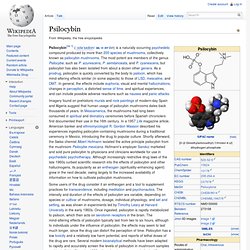

Psilocybin, the Drug in ‘Magic Mushrooms,’ Lifts Mood and Increases Compassion Over the Long Term. The psychedelic drug in magic mushrooms may have lasting medical and spiritual benefits, according to new research from Johns Hopkins School of Medicine.

The mushroom-derived hallucinogen, called psilocybin, is known to trigger transformative spiritual states, but at high doses it can also result in “bad trips” marked by terror and panic. The trick is to get the dose just right, which the Johns Hopkins researchers report having accomplished. In their study, the Hopkins scientists were able to reliably induce transcendental experiences in volunteers, which offered long-lasting psychological growth and helped people find peace in their lives — without the negative effects.
(PHOTOS: Inside Colorado’s Marijuana Industry) “The important point here is that we found the sweet spot where we can optimize the positive persistent effects and avoid some of the fear and anxiety that can occur and can be quite disruptive,” says lead author Roland Griffiths, professor of behavioral biology at Hopkins. Study: Magic mushrooms may permanently make you more open - Novidades - Azarius. Psilocybe cubensis, commonly referred to as magic mushrooms have the potential to make a lasting change to one’s personality. This is a preliminary conclusion from a study conducted by Johns Hopkins researchers and published in the Journal of Psychopharmacology.
A single dose of ‘shrooms’ was enough to make a lasting impression on the personality in 30 of the 51 participants, or nearly 60%. Those who had a hallucinatory or mystical experience after consuming the mushrooms showed increased in the personality trait ‘openness’, which is closely related to creativity and curiosity. This increase was measured 2 months and even 14 months after the last session, which suggests long-term effects.
Study leader Roland Griffiths, a professor of psychiatry, finds this lasting impact on a personality trait remarkable: "Normally, if anything, openness tends to decrease as people get older. " Sources: Journal of Psychopharmacologywww.sciencedaily.com. Psilocybin can occasion mystical-type e - PubMed Mobile. Manna - complete psilocybin mushroom documentary. Psilocybin. Psilocybin[nb 1] (/ˌsɪləˈsaɪbɪn/ SIL-ə-SY-bin) is a naturally occurring psychedelic compound produced by more than 200 species of mushrooms, collectively known as psilocybin mushrooms.

The most potent are members of the genus Psilocybe, such as P. azurescens, P. semilanceata, and P. cyanescens, but psilocybin has also been isolated from about a dozen other genera. As a prodrug, psilocybin is quickly converted by the body to psilocin, which has mind-altering effects similar (in some aspects) to those of LSD, mescaline, and DMT. In general, the effects include euphoria, visual and mental hallucinations, changes in perception, a distorted sense of time, and spiritual experiences, and can include possible adverse reactions such as nausea and panic attacks.
History[edit] Early[edit] Modern[edit] Albert Hofmann (shown here in 1993) purified psilocybin and psilocin from Psilocybe mexicana in the late 1950s. Occurrence[edit] Neurometabolic Effects of Psilocybin, 3,4-Methylenedioxyethylamphetamine (MDE) and d-Methamphetamine in Healthy Volunteers A Double-Blind, Placebo-Controlled PET Study with [18F]FDG.